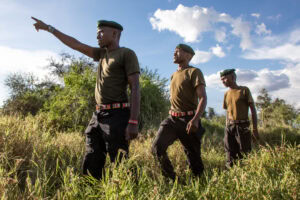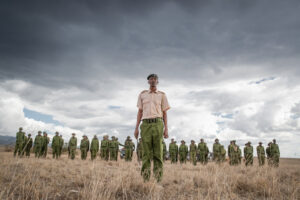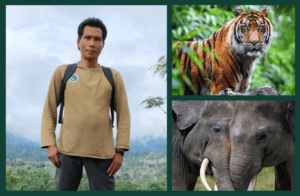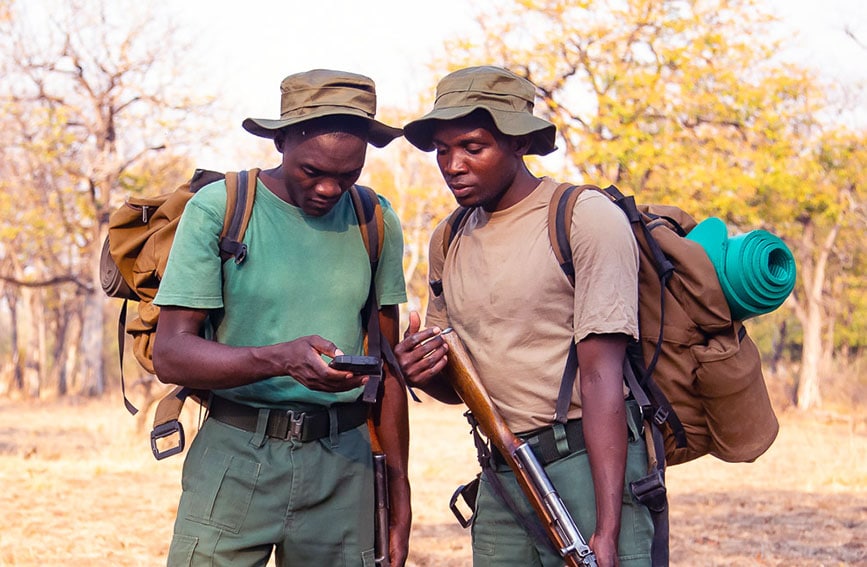Conservation crisis in the Congo

The land where danger lives
The Democratic Republic of the Congo is a land torn by civil unrest. It is also home to some of the most rare and fascinating African wildlife, including lowland and mountain gorillas, chimpanzees, bonobos, okapi, and forest elephants.
Remote parts of DRC have remained like a garden of Eden, where lowland gorillas forage near forest elephants. The okapi is only found in DRC. It’s a large creature so elusive that many of the rangers protecting it have not seen one.
DRC has established many large reserves and national parks, which afford some hope for the survival of these enthralling species. The second-largest country in Africa, many of its regions are isolated by extremely difficult terrain, the tropical rains and a lack of major roads.
Sadly, DRC is where most of Thin Green Line’s Fallen Ranger support goes.
Congo’s conservation crisis
The shocking casualties among the Ranger teams protecting mountain gorillas in Virunga have received worldwide media coverage. Thin Green Line also hears regularly of casualties among Ranger teams in other parks and reserves, predominantly in the country’s east.
Rangers in the Congo are striving to protect all types of animals from well-armed insurgents hunting for bushmeat. Thousands of hippos have been slaughtered by insurgents in the last decade. Smoked bushmeat helps fund illegal militia operations by large groups operating extensively in the east of the country. Gorillas have been hunted for bushmeat too.
Thin Green Line has worked with Emmanuel de Merode, director of Virunga National Park, to deliver support following the shocking attacks on rangers there in recent years.
When Emmanuel was appointed, he well understood what he was facing.
“The intensity of the conflict in and around the park makes this a daunting challenge, but it is a great privilege to be working with a dedicated and courageous team of rangers,” he said.
Thin Green Line also supports the rangers protecting bonobos and forest elephants at Iyondji Community Bonobo Reserve in DRC, together with rangers protecting gorillas in other parts of DRC.
Linda Nunn, vice-president of the International Ranger Federation, has worked closely with the rangers protecting mountain gorillas in Virunga.
“Rangers all over the Democratic Republic of the Congo go about their daily work in national parks, and some reserves, with limited resources and often in extremely dangerous situations,” said Linda.
“The rangers work for the ‘Institut Congolais pour la Conservation de la Nature’ (ICCN). ICCN rangers have received many awards for their courage over the years. Their bravery and dedication to duty is legendary.”
“In Virunga, ICCN traditionally names newborn gorillas after fallen rangers,” Linda said.
In addition to the danger from insurgents, rangers in DRC face very similar challenges to their colleagues in other countries. Flooded rivers, as well as snakes and leopards have accounted for the deaths of seven Congo rangers in recent years.
To date, we know of 19 rangers killed in DRC in 2022. In many cases, two or three rangers have been killed in single incidents.
National parks and reserves are isolated by the country’s lack of transport infrastructure. The scarcity of well-maintained roads and railways aren’t just symptomatic of the country’s poverty, it’s also due to the difficult terrain, the climate and size of the country.
Rangers working in some reserves in eastern DRC are many hours away from care if they need emergency medical treatment. There’s no rescue by helicopter. They’re more likely to have to ride pillion on a motorbike, along unsealed potholed roads, literally holding on for dear life.
Thin Green Line is incredibly grateful to the small, community-based groups who coordinate requests for assistance from the families of fallen rangers. The diligent and timely work of local groups, nearly all led by women, who have to deal with frequent power outages and unreliable internet, has enabled financial assistance from Thin Green Line’s supporters to reach young widows and their children in remote parts of the Congo.
Mme Joséphine Misamu, director of Together for Rights of Nature EDN, coordinated some of the recent applications.
“Thank you to The Thin Green Line Foundation for their financial assistance to the families of nature conservationists who have fallen in battle to defend and protect our environment,” she said.
Nature in turmoil
DRC has five World Heritage sites. The four sites in eastern DRC are all classified as ‘in danger’.
- Garamba National Park (eastern DRC)
- Kahuzi-Biega National Park (eastern DRC)
- Okapi Wildlife Reserve (eastern DRC)
- Salonga National Park (western DRC)
- Virunga National Park (eastern DRC)
European Union support
In 2022, the EU allocated €44 million in humanitarian funding to address the needs of the most vulnerable people in the DRC.
In 2021, EU allocated over €70 million to support emergency humanitarian actions in the DRC. This amount does not include bilateral humanitarian support by individual EU countries.
Most of the EU-funded humanitarian projects are helping vulnerable people in the east of the country, where persistent conflict is ongoing.
The EU works with partners to:
- provide food assistance and nutrition, shelter, protection, emergency healthcare, including care for survivors of sexual violence
- improve water, sanitation and hygiene conditions
- ensure that children caught in humanitarian crises can go to school.
The EU’s support also allows humanitarian organisations with specific expertise in nutrition to work in areas that have alarming malnutrition levels, saving the lives of thousands of children.
In the face of the additional challenges brought about by COVID-19, EU-funded humanitarian projects in the DRC continue to provide life-saving humanitarian assistance for people in need.
Thin Green Line’s commitment
Even with the European Union’s commitment to the country, the team at Thin Green Line work hard to ensure the families of Fallen Rangers aren’t overlooked. We are dedicated to maintaining our pledge to provide assistance to every family so tragically affected by the death of a Ranger.
Click the link below today to contribute to our Fallen Ranger fund.
References
Paul Raffaele – Among the Great Apes (New York, 2011) ISBN13 9780061671845
Human-Elephant conflict – DRC (Forgotten Parks Foundation) https://forgottenparks.org/hecandtroublesatkatala
http://www.g4g.co.uk
https://ec.europa.eu/echo/where/africa/democratic-republic-congo_en




